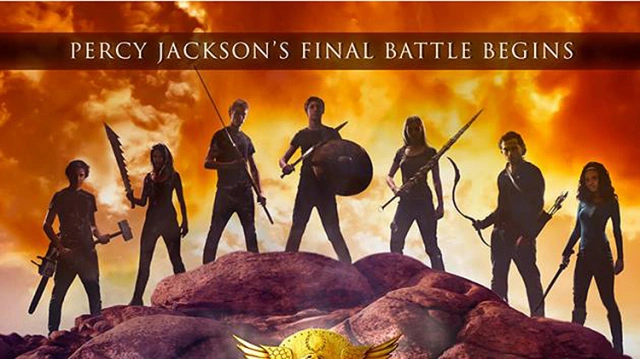Blood of Olympus (2025)

Blood of Olympus (2025)
Betrayal Ignites the Heavens: The Gods Battle for Supreme Power
Rating: 9/10
In Blood of Olympus (2025), the universe of Greek mythology is thrown into turmoil as gods, titans, and mortals face their most dangerous and dramatic confrontation yet. This visually stunning and emotionally intense blockbuster follows the betrayal of Zeus (Chris Hemsworth), the mighty ruler of Olympus, who finds himself exiled and stripped of his godly powers. In the ultimate test of strength, strategy, and will, Zeus must face death matches with some of the most dangerous and powerful beings in existence. The stakes? Not only his throne, but the very fate of Olympus itself. The gods are no longer merely part of mythology—they are players in an epic war where survival means more than victory; it means redemption or destruction.
Plot Overview:
At the heart of Blood of Olympus is the deeply personal and soul-shaking downfall of Zeus. Once revered as the Supreme God of Olympus, Zeus is betrayed by his closest allies—Loki (Timothée Chalamet) and Hephaestus (Jason Momoa). The battle for the throne isn’t just a fight between gods but a war for control over the cosmos, with devastating consequences for everyone. The gods must battle in arenas that span across fiery volcanoes, storm-battered seas, and ancient ruins where the laws of nature no longer apply. As Zeus is torn from his throne, cast into exile, and forced to fight for survival, the lines between vengeance and redemption blur.
The film explores Zeus’s struggle to regain control not only over his throne but also over the gods’ legacy. For centuries, he had ruled the heavens with an iron fist, but after this betrayal, the balance of power has shifted. With his strength fading, Zeus must contend with new enemies, new alliances, and his own deteriorating morality. Through these brutal confrontations, Blood of Olympus pushes its characters to their limits, forcing them to confront their own deepest fears, insecurities, and regrets.
The Gods of Olympus:
In this fierce battle for supremacy, Zeus faces some of the most cunning and powerful gods of the pantheon—each of whom has their own agenda.
-
Loki (Timothée Chalamet): The trickster god and master manipulator, Loki’s role in Zeus’s betrayal is more than just a simple act of defiance. His deception runs deep, challenging everything Zeus once believed about loyalty, trust, and justice. Loki’s ambitions are as dark as they are vast—his endgame is to seize the throne of Olympus for himself, but his loyalty to no one but himself leaves him with few allies. Chalamet delivers a performance that balances charm and menace, embodying Loki’s duality with every cunning move.
-
Hephaestus (Jason Momoa): The god of fire and forge, Hephaestus is both Zeus’s ally and betrayer. Having long harbored resentment for the way the gods have treated him, Hephaestus seizes the opportunity to betray Zeus, hoping to free the gods from his reign and install a new order—one where he has ultimate control. Jason Momoa’s portrayal of Hephaestus brings a firebrand ferocity to the character, a god shaped by years of rejection and pain. Hephaestus’ fiery presence, both on and off the battlefield, makes him a formidable opponent for Zeus.
-
The God of Winds: This powerful god wields control over the air, commanding violent storms and tornadoes with a flick of his hand. The God of Winds is an embodiment of chaos itself—untamed, relentless, and as unpredictable as the storms he controls. Standing against Zeus, his power is an unstoppable force, and his role in the conflict adds another layer of danger to Zeus’s battle. With the winds of fate shifting with every passing moment, this god proves to be one of Zeus’s greatest threats.
As Zeus struggles against these adversaries, he faces not only the fury of their attacks but also the psychological toll of his fall from grace. Each match pits his resilience and willpower against the gods’ immense power, and his internal conflict—whether to fight for vengeance or seek redemption—becomes the emotional heart of the film. Every battle becomes a stepping stone toward his ultimate decision: Does he seek revenge on the gods who betrayed him, or is there a greater purpose behind his journey back to the throne?
Visuals and Action:
Blood of Olympus delivers a feast for the eyes, with some of the most visually stunning battle sequences ever seen on screen. The arenas where the gods fight are breathtakingly vast, and each environment is meticulously crafted to evoke a sense of awe and danger. From the fiery volcanoes that churn with molten fury to the storm-lashed seas where lightning crackles across the sky, the setting for each battle feels like another character in the film.
The special effects in Blood of Olympus are nothing short of spectacular, with towering titans and gods locked in vicious combat that seems to tear the heavens apart. The fight sequences are beautifully choreographed, blending ancient mythological weapons with modern cinematic techniques. Every clash, every blow feels powerful, and the stakes are incredibly high as Zeus and the gods fight not only for their lives but for the very future of the cosmos.
Director Zack Snyder, known for his knack for bringing visual grandeur to mythological tales, brings a sense of scale and gravitas to Blood of Olympus. The camera work, often sweeping and dynamic, captures the intensity of the battles while allowing the viewer to feel the weight of the gods’ power. The lightning strikes, firestorms, and hurricane-force winds add to the sense of epic chaos, making the gods’ confrontations feel like forces of nature in themselves.
Thematic Depth:
At its core, Blood of Olympus is not just a tale of gods clashing for power—it’s a meditation on legacy, trust, and redemption. Zeus’s journey is as much about his internal struggle as it is about his external battles. Having ruled the heavens for millennia, his identity has been closely tied to his power. But in the face of betrayal, he is forced to question whether his reign was ever truly just, or if he has simply been clinging to a throne built on lies. Can he redeem himself and restore Olympus to its former glory, or is his fall inevitable? And, in the end, what kind of god does he want to be?
The film touches on the complexities of power—how it corrupts, isolates, and destroys, but also how it can be used for good. Zeus’s story is one of reflection and transformation, learning that true strength isn’t found in the throne, but in the bonds of loyalty, love, and sacrifice. The gods’ battles, filled with violence and vengeance, are ultimately mirrored by their personal journeys, where each god faces the consequences of their actions.
Supporting Cast and Performances:
-
Anna de Armas as Hera, the ever-loyal but often sidelined queen of Olympus, is given a much deeper, more poignant role. As Zeus struggles with his downfall, Hera must also confront her feelings of abandonment and her own secret motivations.
-
Giancarlo Esposito portrays a new character, a fallen god of wisdom, who offers insight into the ancient prophecies that guide the gods’ fates. His presence brings an aura of gravitas to the film’s more philosophical moments.
Conclusion:
Blood of Olympus (2025) is more than just a spectacle of gods battling each other in fiery arenas—it is a story of redemption, betrayal, and the consequences of power. With a stellar cast led by Chris Hemsworth, Timothée Chalamet, and Jason Momoa, the film expertly balances epic action with emotional depth. Snyder’s direction ensures that the film remains visually stunning while also exploring themes of personal growth, legacy, and sacrifice.
In the end, Blood of Olympus delivers a gripping tale of gods fighting not just for control over Olympus, but for their very souls. With breathtaking visuals, intense action, and a storyline that challenges the gods’ understanding of loyalty and redemption, this film promises to be an unforgettable addition to the mythological genre.
RELATED MOVIES











